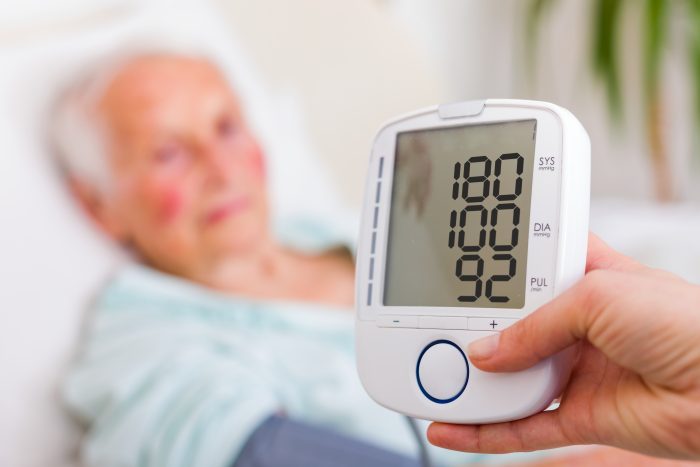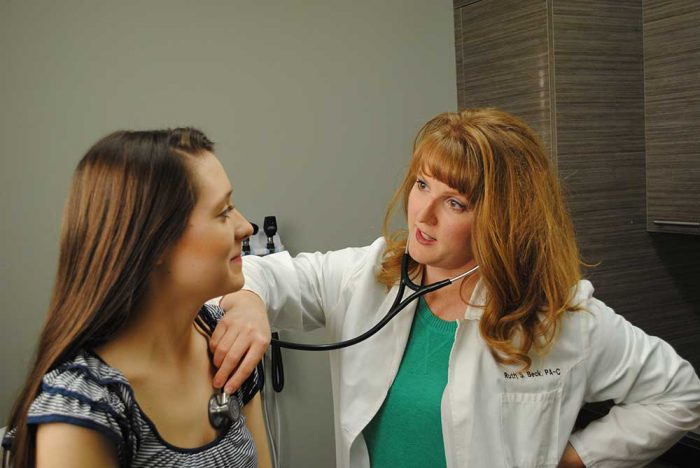
Hypertension Maintenance
Hypertension (high blood pressure) is a common condition that effects about 1/3 of the population. Unfortunately, a person may have high blood pressure for years without experiencing symptoms, which makes this a very dangerous disease.
While identifying hypertension is easy, the only way to know the problem exists is through regular check-ups with Dr. Ward. If detected, Dr. Ward can work to control the high blood pressure through hypertension maintenance treatments.
What is blood pressure?

Blood pressure is the force inside a blood vessel that is exerted outward against the walls of the vessels. The pressure varies based on the amount of blood the heart pumps and the amount of blood flow resistance that exists in the arteries.
Simply stated, the more blood that is pumped and the narrower the arteries, the higher the blood pressure climbs.
Blood pressure naturally increases and decreases daily as the cardiovascular system reacts to sleep, physical activity, excitement, anxiety and stress. Having high blood pressure for just a short period of time is a normal physiological response.
How is high blood pressure determined?
Long term hypertension/high blood pressure generally develops over many years. The common risk factors of high blood pressure include:
- Obesity/ Overweight
- Sedentary Lifestyle
- Alcohol Consumption
- Smoking
- High Sodium Diet (from processed foods)
- Family History of the Disease.
Blood pressure analysis is comprised of two measurements, the systolic and diastolic pressure readings which are measured with a sphygmomamometer – the familiar upper-arm cuff device. The systolic reading is the pressure as the heart pumps blood around the body. The diastolic reading is the pressure as the heart relaxes and refills with blood. Pressures are measured in millimeters of mercury (mmHg).
According to the American Heart Association (AHA), the following ranges of blood pressure are outlined in mmHg:
| Status | Systolic | Diastolic |
|---|---|---|
| Normal | <120 | < 80 |
| Prehypertension | 120 – 139 | 80 – 89 |
| Stage 1 Hypertension | 140 – 159 | 90 – 99 |
| Stage 2 Hypertension | 160 > | 100 > |
| Hypertensive Crisis | 180 > | 110 > |
While symptoms are not typically apparent in early stages of hypertension, there are symptoms to be aware of:
- Severe headache
- Confusion
- Vision problems
- Chest Pain
- Fatigue
- Irregular heartbeat
- Irregular breathing
- Pounding sensations
Long term hypertension leads to serious health problems like heart disease or stroke. As we age, blood pressure will increase steadily because their arteries become stiffer and narrower.
Being aware of the symptoms can help prevent serious situations, however, in a hypertensive crisis, emergency care is necessary. In such cases, 911 should be called for assistance.
Treating High Blood Pressure

The Department of Health and Human Services launched a Million Hearts initiative which is aimed to prevent 1 million heart attacks and strokes in the United States. Control of hypertension is a key national priority and Dr. Ward is intimately involved to help treat and maintain blood pressure with his patients.
As mentioned, annual physicals will help identify potential hypertension concerns. During the physical, Dr. Ward will review your health history, medications, lifestyle, and diet to determine potential causes of the high blood pressure. Certain diseases and medications can cause high blood pressure so a comprehensive overview of the patients’ health will be examined.
Simple lifestyle changes frequently reduce blood pressure very effectively. These changes may include:
- Salt restriction
- Moderation of alcohol consumption
- High consumption of vegetables and fruits
- Reducing and maintaining lower weight
- Regular physical aerobic exercise
- Stress reduction
While lifestyle changes are the first-line treatment of high blood pressure, anti-hypertensive medications may also be prescribed. If medications are prescribed, they are typically started at a low dose and side-effects are typically minor.
There are a number of drugs available to help lower blood pressure. After Dr. Ward has completed a thorough physical examination he will determine which medication is appropriate based on in the individual and their current condition.
If you or someone you know is concerned about hypertension and high blood pressure, please call Dr. Ward for an appointment.
